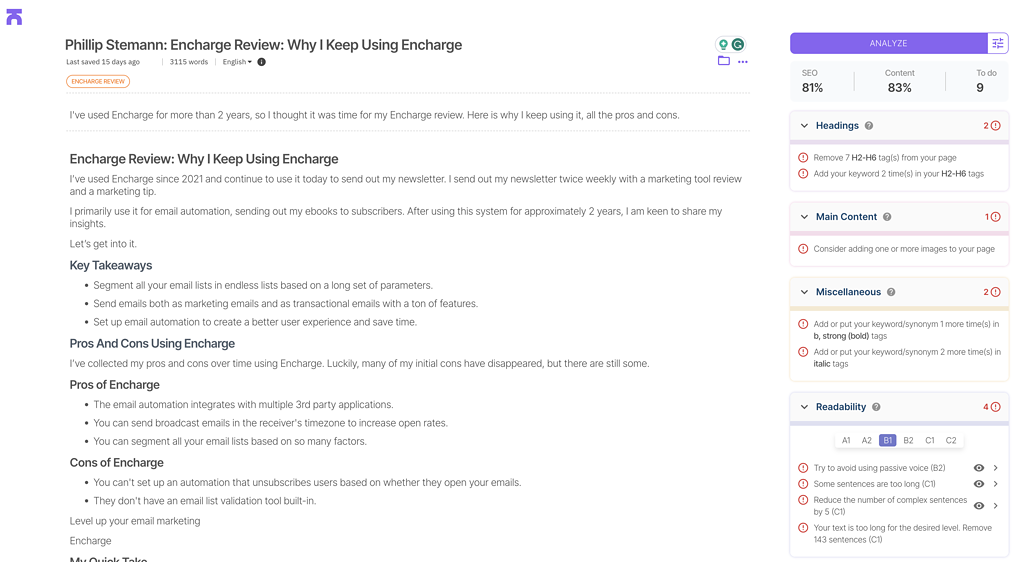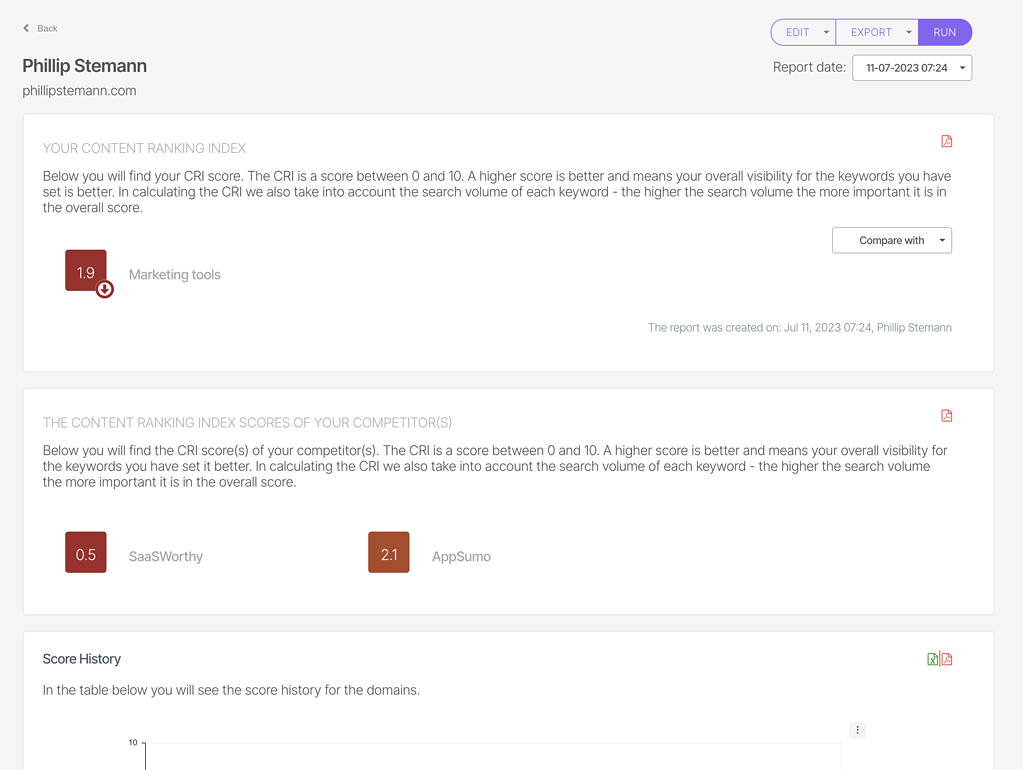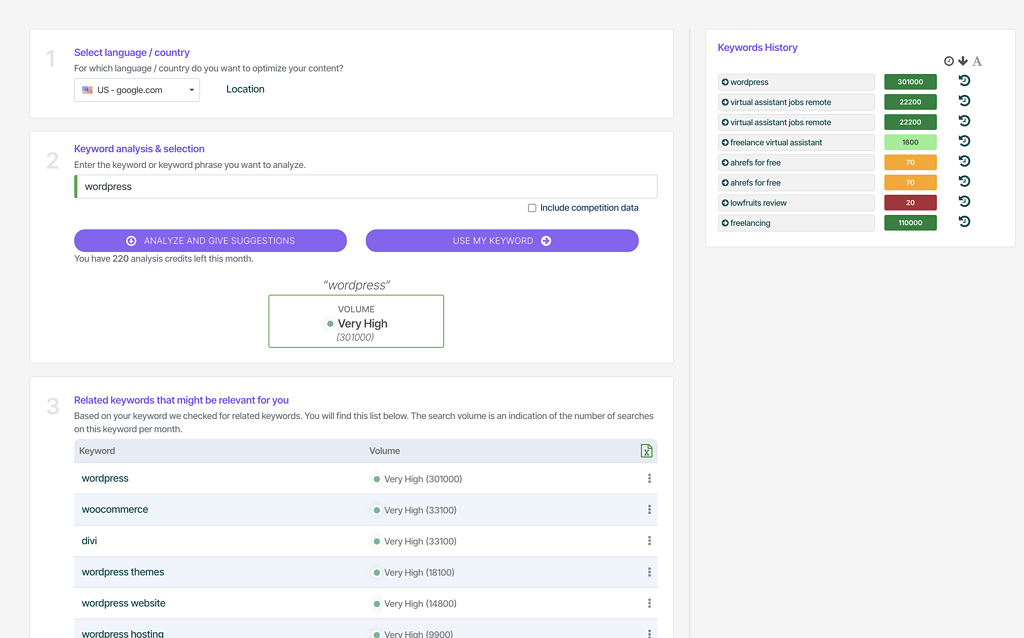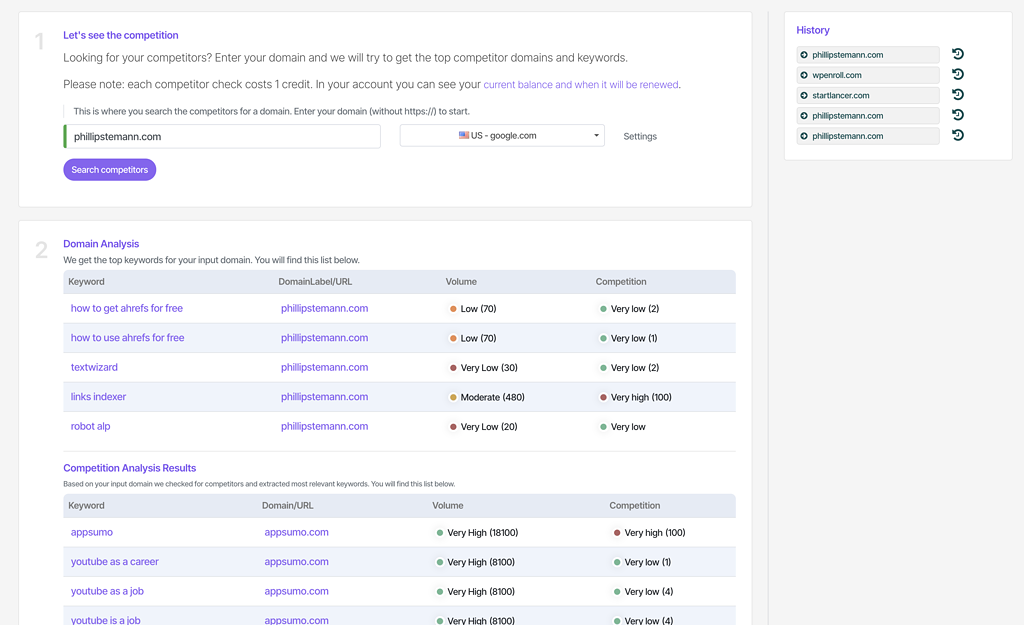Textmetrics is one of those underrated SEO tools that takes no time to run your content through, but the results of using Textmetrics are abnormal.
Textmetrics analyses your content just like the Hemingway Editor and tells you if some paragraphs are too long, too difficult to read, or missing some elements.
It’s such an exciting SEO tool, so let’s get into it.
Key Takeaways
- It gives you actionable to-dos on improving your content’s readability.
- Track your pages to see how they’re ranking for a specific keyword.
- Run a competitor analysis and compare yourself to your competition daily.
Pros And Cons Using Textmetrics
Textmetrics surprised me, and it’s really different from other content optimization tools such as Surfer SEO and Frase.
The readability feature is something that sets Textmetrics apart and ensures high content quality.
Pros of Textmetrics
- It makes it easy to create engaging content with live feedback on your writing.
- AI-assistant to create engaging meta titles and descriptions.
- Page tracking makes it exciting to track your individual pages.
Cons of Textmetrics
- No AI assistant for writing the body content of your blog posts.
- You can only track one keyword per article, no secondary keywords.

Textmetrics
My Quick Take
TextMetrics is a solid content optimization tool to help you write more engaging content, and it’s super easy to use.
You have a live assistant that tells you what to do with your content, whether shortening it or adding bolded words. It’s incredible.
What Is Textmetrics?

Textmetrics is a content tool for many use cases, but overall, it improves the readability of your content and makes it more engaging.
This is a broad result, but you can use it to increase conversion rates. It includes keyword research tools, the ability to track your page performance, and much more.
You can use Textmetrics directly in your WordPress website as well because they’ve made it an SEO plugin for 27 applications, which is super impressive.
Textmetrics is a super underrated SEO tool, and I hope they’ll continue to improve because Textmetrics SEO will become super powerful.
The live assistant that gives you feedback and technical SEO suggestions right now is outstanding, but it can always improve.
Get actionable SEO tips in your inbox
Join 900+ other website owners to receive a weekly SEO video from my YouTube channel, which I’ll share.
And on top of that, an actionable SEO tip every week.
Textmetrics Review Features
Now, to the features, I’ve been so excited using Textmetrics, but they could still improve some elements. Let’s get into it.
The SEO Content Live Assistant

This is definitely where I spent the most time during my use of Textmetrics. This is the live assistant where you can either write your content or import your content.
You can import it via URL or simply copy and paste your content, and then you get suggestions on the right on how to improve your content.
Based on the analysis, you get everything from basic content SEO suggestions to suggestions that improve readability.
Textmetrics content analysis is super thorough, and you get a to-do on the right with everything from shortening your paragraphs to adding more headings.
It’s super easy to use, and one of my favorite suggestions is when the live assistant suggests adding bolded words or cursive words.
On top of this, you can use AI to generate a meta title and a meta description to improve the content perspective and your click-through rate in Google.
The content analyzer overall is awesome for giving you suggestions, and the content checker is constantly running with suggestions.
Pagetrackers: Monitor Your Content
The Pagetracker module is very different from the content optimization dashboard.
The Pagetracker module is where you basically track your pages for a specific keyword, and it has its pros and cons.
There is no doubt that we always write a piece of content for a primary keyword, but a content piece also always ranks for many variations of that keyword and other keywords as well.
So, I wish you could track your page for multiple keywords, but right now, you can only track it for one keyword.
Then, you choose your URL and search engine and get your overview. As you can see from the image, I’ve run it on one of my articles, and it goes up and down like all other rankings.
You can also see the top-ranking pages on the keyword, which you can then analyze to find content gaps that you can fill out and hopefully rank higher.
Overall, it’s a great module, but I feel it’s missing some functionality.
Content Ranking: Compare Your Content

While you can’t track multiple keywords in the Pagetracker module, you can do that with the content ranking module.
This is a competitive analysis where you can compare yourself to your competition.
For each competitor, you can compare yourself on your rankings on specific keywords, but you also get a score on how well you’re doing, and of course, the highest score is doing best.
The score is based on how well the domain ranks for the keywords. When you create a report, you enter your competitors and the target keywords you want to focus on.
Interestingly, you can compare yourself to your competitors and make your content SEO-friendly by comparing your content to your competitor if your competitor ranks higher than you.
Keyword Analysis: Basic Keyword Research

Textmetrics also offers a simple keyword research and analysis tool.
I often used this by entering my seed keyword to get keyword suggestions from the tool.
When I look at it from a Keyword research aspect, it’s not the best keyword research tool I’ve used, and I also see it as a nice add-on.
It doesn’t suggest long-tail keywords, only super competitive keywords, and yes, they have a ton of searches, but they are also nearly impossible to rank for.
It’s super easy to use, though, and you can start your journey here. Enter your keyword in the keyword search option, then click on use my keyword.
Then, you’ll be redirected to the live assistant, and then you can start writing content and get on-page ranking suggestions on how to write more engagingly.
If you’re looking for a better keyword research tool, then you can try the LowFruits keyword tool, which is my favorite keyword research tool.
Competition: Find Your Content Competitors

If you don’t know your competitors, then Textmetrics also offers a competition module.
You simply enter your domain and choose your search engine. Then, Textmetrics finds the keywords you’re ranking for and your competition on those keywords.
Of course, the more times a domain is shown on your ranking keywords, the closer the competitor is.
However, if you’re a new domain or don’t have that much content, you won’t be able to use this tool.
It’s purely based on keywords Textmetrics already know from their database.
Pro-tip: If you’re a new website, manually google your keywords and save the domains showing on your keywords. Then, you’ll build your competition list.
27 SEO Plugins: Plugins For Any Content Tool

Textmetrics has developed plugins for 27 applications. It’s incredible how thorough they’ve been, and this is everything from CMS such as WordPress and Drupal to content writers like Word and Google Docs.
Here is an exhaustive list of the applications they integrate to:
- Outlook
- Word
- Google Docs
- Edge
- Chrome
- Bullhorn
- UKG
- Paychex
- OTYS
- SmartRecruiters
- PageUp
- Carerix
- Recruiterflow
- Recruitee
- Visma EasyCruit
- Ubeeo
- WordPress
- Joomla
- Drupal
- Craft
- Umbraco
- Sitecore
- Expression Engine
- Epi Server
- Kentico
- Adobe Experience Manager
Who Is Textmetrics Made For?
Textmetrics is made for content creators, even if you send many sales emails.
Of course, it’s perfect if you’re working with SEO and want to ensure the content is engaging, easy to read, and has the right amount of bolded words, etc.
But the readability module makes it perfect for anyone working with content, whether for social media, websites, emails, or elsewhere.
Overall, Textmetrics is a tool for content optimization in any sense.
So, if you’re working with content and want to improve your search rankings for long-tail keywords or you’re writing content for social media, I highly recommend you try Textmetrics.
Wrap-Up: Is Textmetrics Worth It?
Yes, Textmetrics is worth it. It’s an underrated analysis power tool for you if you’re working with content.
Its primary use is for content creation, whether blog posts or quick email copies, and the live assistant can help you produce engaging content.
The job posting module is the newest module they’ve added, and they continue to add features. It seems we have a future superstar within SEO tools in the making.
I’ve primarily used it to optimize my SEO content and ensure that with solid SEO strategy suggestions, I keep my content engaging and easy to read.
The readability analysis is one of my favorite features, as it helps me write content for search engines and humans with real-time feedback. It’s simply incredible.

Textmetrics
My Last Thoughts
Ultimately, I want to highlight that if you’re a content creator looking to make your content more engaging, try Textmetrics.
Their live assistant is just that good, and you can track your content along the way to see if your changes improved the rankings.
Textmetrics

Textmetrics is an excellent tool for analyzing your content for the reading score and analyzing your website thoroughly from multiple angles.
3.5
Pros
- It makes it easy to create engaging content with live feedback on your writing.
- AI-assistant to create engaging meta titles and descriptions.
- Page tracking makes it exciting to track your individual pages.
Cons
- No AI assistant for writing the body content of your blog posts.
- You can only track one keyword per article, no secondary keywords.


